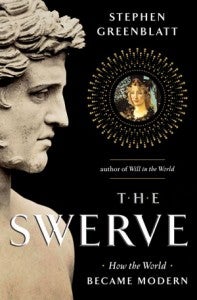Stephen Greenblatt: The Swerve: How the World Became Modern
ListenHour 2
 A 15th Century ‘book hunter’ ordered an ancient, forgotten poem lost in a monastery, to be copied. This work was considered dangerous at the time, as it questioned the role of religion in society. Our guest, STEPHEN GREENBLATT, writes the long-term effects of the circulation of Lucretius’ “On the Nature of Things” shaped the minds of Galileo, Darwin, Freud and Einstein in his new book, “The Swerve: How the World Became Modern.” Greenblatt is the general editor of The Norton Shakespeare and the author of “Will in the World: How Shakespeare Became Shakespeare.”
A 15th Century ‘book hunter’ ordered an ancient, forgotten poem lost in a monastery, to be copied. This work was considered dangerous at the time, as it questioned the role of religion in society. Our guest, STEPHEN GREENBLATT, writes the long-term effects of the circulation of Lucretius’ “On the Nature of Things” shaped the minds of Galileo, Darwin, Freud and Einstein in his new book, “The Swerve: How the World Became Modern.” Greenblatt is the general editor of The Norton Shakespeare and the author of “Will in the World: How Shakespeare Became Shakespeare.”
Listen:
[audio: 092211_110630.mp3]
WHYY is your source for fact-based, in-depth journalism and information. As a nonprofit organization, we rely on financial support from readers like you. Please give today.


